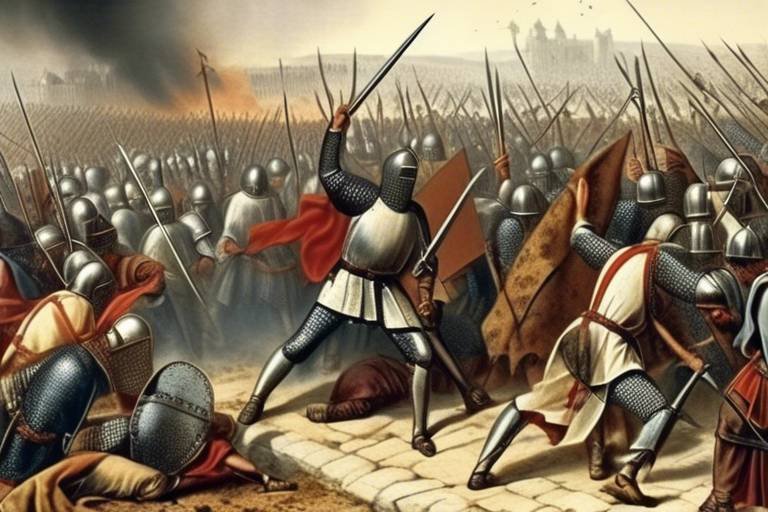The History of Slavery in the Ancient World
Slavery in the ancient world is a complex and deeply ingrained institution that shaped the course of history in numerous civilizations. From the earliest origins of slavery to its eventual decline, the practice of owning and exploiting individuals as property had profound implications for ancient societies. The history of slavery in the ancient world reveals the intricate dynamics of power, labor, and social hierarchies that defined these civilizations.

Origins of Slavery
Slavery in the ancient world had various origins, from debt bondage and conquest to being born into slavery. Different civilizations had unique ways of acquiring and using slaves.
Debt bondage was a common way for individuals to become enslaved in ancient societies. When people were unable to repay their debts, they would often be forced into servitude to work off what they owed. This form of slavery was prevalent in many ancient civilizations, where economic hardships could easily lead to enslavement.
Conquest was another significant factor in the origins of slavery. Victorious armies would often take captives from the defeated side as slaves, using them for various purposes such as labor, domestic work, or even as concubines. This practice of enslaving conquered peoples contributed to the growth of slave populations in many ancient empires.
Moreover, some individuals were born into slavery, inheriting their status from enslaved parents. In societies where slavery was entrenched, being born as a slave meant a lifetime of servitude with little to no hope of freedom. This hereditary form of slavery perpetuated the institution across generations.
Each civilization had its own unique methods of acquiring slaves, whether through warfare, trade, or as a result of social status. The diverse origins of slavery in the ancient world highlight the complex ways in which individuals became enslaved and the lasting impact it had on societies.
1. Were all slaves in the ancient world captured in wars?
2. How were slaves treated differently based on their roles in society?
3. What were the main economic activities that relied on slave labor?
4. Did any ancient civilizations have laws protecting the rights of slaves?
5. How did the decline of slavery in the ancient world impact future societies?

Role of Slaves in Ancient Societies
In ancient societies, the role of slaves was multifaceted and indispensable. These individuals were responsible for a wide array of tasks that were crucial for the functioning of economies and households. From domestic chores to skilled craftsmanship, slaves performed a variety of duties that supported the daily operations of their societies. In agricultural settings, slaves played a vital role in cultivating crops, tending to livestock, and maintaining the land. Their labor was essential for sustaining food production and ensuring the economic stability of ancient civilizations.
Moreover, slaves were often engaged in construction projects, mining operations, and other labor-intensive activities that required manual labor. Their contributions were instrumental in the development of infrastructure, such as roads, buildings, and monuments, that shaped the physical landscape of ancient societies. Without the labor of slaves, many monumental structures and public works projects would not have been possible, highlighting the significant role these individuals played in the advancement of ancient civilizations.
Additionally, slaves were involved in domestic work within households, performing tasks such as cooking, cleaning, and childcare. Their presence allowed free citizens to focus on other pursuits, such as education, politics, and commerce, thereby contributing to the social and cultural advancement of ancient societies. While the specific roles and responsibilities of slaves varied across different civilizations, their collective impact on the daily life and functioning of these societies cannot be understated.

Living Conditions of Slaves
Slavery in the ancient world had various origins, from debt bondage and conquest to being born into slavery. Different civilizations had unique ways of acquiring and using slaves.
Slavery in the ancient world had various origins, from debt bondage and conquest to being born into slavery. Different civilizations had unique ways of acquiring and using slaves.
Slaves performed a wide range of tasks in ancient societies, from domestic work to agricultural labor and even skilled craftsmanship. Their roles were crucial for the functioning of economies and households.
Slaves often lived in harsh conditions, facing overcrowding, poor sanitation, and inadequate food and clothing. Their treatment varied across civilizations, with some experiencing extreme cruelty.
The use of slave labor had a significant impact on ancient economies, allowing for the development of large-scale agricultural production, mining operations, and construction projects. Slaves were essential for economic growth.
Various factors contributed to the eventual decline of slavery in the ancient world, including economic changes, social movements, and shifts in moral attitudes. The fall of empires and the rise of new ideologies also played a role.
Throughout history, there were several notable slave revolts in the ancient world, such as the Spartacus revolt in Rome and the rebellion led by the slave leader, Spartacus. These uprisings had a lasting impact on society.
The legacies of ancient slavery continue to be felt today, influencing modern discussions on race, labor rights, and social justice. Understanding the history of slavery in the ancient world is crucial for addressing contemporary issues.
Scholars and historians continue to study and debate the complexities of ancient slavery, exploring its lasting effects on societies and individuals. Analyzing ancient slave systems helps us comprehend the broader history of human exploitation and resilience.
Stay tuned for a section dedicated to answering common questions about the history of slavery in the ancient world.

Impact on Economies
Slavery had a profound impact on the economies of ancient civilizations, shaping the way societies functioned and developed. The utilization of slave labor enabled the expansion of various economic sectors, driving growth and prosperity in many regions. One of the primary areas where slavery made a significant impact was in agriculture. Slaves were extensively used in farming, cultivating crops, tending livestock, and managing agricultural estates. Their labor ensured a steady food supply and boosted agricultural output, leading to surplus production that could be traded or stored for future use.
Moreover, the use of slaves in mining operations played a crucial role in the extraction of valuable resources such as gold, silver, and precious stones. Slaves worked in dangerous conditions in mines, extracting ores and minerals that were essential for the economy. The abundance of natural resources obtained through slave labor fueled economic growth, trade, and the accumulation of wealth for ruling elites.
Additionally, slaves were instrumental in construction projects, where their labor was vital for building infrastructure such as roads, bridges, temples, and palaces. The construction of monumental structures and architectural marvels in ancient civilizations was made possible by the labor of slaves. Their contribution to large-scale building projects not only showcased the power and wealth of rulers but also facilitated trade and communication networks, enhancing economic activities.
The economic impact of slavery extended beyond specific sectors to influence the overall structure of ancient economies. The presence of a large slave population provided a cheap and abundant source of labor, reducing production costs and increasing profits for slave owners. This economic advantage allowed for the accumulation of wealth and the concentration of power in the hands of a few, leading to social stratification and inequality within societies.
Furthermore, the reliance on slave labor in ancient economies had long-term consequences, shaping social hierarchies, cultural practices, and political systems. The institution of slavery influenced the distribution of wealth, the division of labor, and the organization of production, leaving a lasting imprint on the economic landscape of ancient civilizations. The legacy of slavery continues to impact modern discussions on labor rights, economic disparities, and social justice, underscoring the enduring significance of understanding its economic ramifications.

Decline of Slavery
The decline of slavery in the ancient world marked a significant shift in societal structures and economic systems. As civilizations evolved and new ideologies emerged, the institution of slavery began to wane, paving the way for different forms of labor relations.
One of the key factors contributing to the decline of slavery was the changing economic landscape. As trade routes expanded and new technologies emerged, the reliance on slave labor diminished. The costs associated with maintaining a slave workforce became less sustainable as other labor options became available.
Social movements also played a crucial role in challenging the institution of slavery. Advocates for human rights and equality began to question the morality of owning another human being, sparking debates and discussions that ultimately led to the abolition of slavery in many ancient societies.
Shifts in moral attitudes towards slavery also influenced its decline. As philosophical and ethical ideas developed, notions of freedom and individual rights gained prominence, leading to a reevaluation of the treatment of slaves and their status in society.
The fall of empires and the rise of new political systems also contributed to the decline of slavery. As power dynamics shifted and new rulers came to power, the institution of slavery lost its stronghold, making way for more inclusive and equitable forms of labor organization.
Overall, the decline of slavery in the ancient world was a complex and multifaceted process, shaped by economic, social, and ideological changes. It marked a significant turning point in human history, setting the stage for the development of new labor systems and the recognition of universal human rights.

Ancient Slave Revolts
Ancient history is filled with tales of rebellion and resistance, and the slave revolts in the ancient world stand out as powerful examples of defiance against oppression. One of the most famous uprisings was the Spartacus revolt in Rome, led by the gladiator Spartacus. This revolt, which lasted from 73 to 71 BCE, shook the Roman Republic to its core, as Spartacus and his followers challenged the might of one of the most powerful empires in history.
The rebellion led by Spartacus was not just a fight for freedom but a symbol of hope for all those who were enslaved. Spartacus, a former gladiator, managed to gather a large army of slaves and free men, showing that even the most marginalized individuals could rise up against their oppressors. The revolt spread fear among the Roman elite and inspired others to join the cause.
Similarly, in ancient Greece, the rebellion led by the slave leader, Spartacus, also known as the Helot revolt, was a significant challenge to the Spartan state. The Helots, who were enslaved by the Spartans, rose up in revolt multiple times, demanding their freedom and rights. These revolts, though often brutally suppressed, highlighted the deep-seated tensions within Spartan society.
These ancient slave revolts were not just isolated incidents but rather reflections of the systemic injustices and inequalities that existed in ancient societies. The courage and determination of the rebels left a lasting impact on history, serving as a reminder of the human spirit's resilience in the face of adversity.

Legacies of Ancient Slavery
The legacies of ancient slavery are deeply intertwined with the fabric of modern society, leaving a lasting impact on various aspects of our lives. One of the most significant legacies is the perpetuation of racial inequalities and discrimination that originated from the system of slavery in the ancient world. The hierarchical structures and power dynamics established during that time continue to influence social hierarchies and power imbalances today.
Furthermore, the economic foundations laid by ancient slavery still resonate in contemporary labor practices and global supply chains. The exploitation of labor, unequal distribution of resources, and the commodification of human beings trace back to the roots of ancient slavery, shaping the way we perceive work, value, and human rights in the present day.
Moreover, the psychological trauma inflicted on generations of enslaved individuals has left a profound mark on collective memory and cultural identities. The legacy of trauma, resilience, and resistance passed down through generations serves as a reminder of the enduring impact of slavery on mental health, community dynamics, and cultural heritage.

Modern Perspectives on Ancient Slavery
Scholars and historians today continue to delve into the complexities of ancient slavery, seeking to unravel its enduring impact on societies and individuals. Through meticulous research and analysis, these experts aim to shed light on the intricate dynamics of slave systems in antiquity and their repercussions on contemporary issues.
By examining the historical context and examining primary sources, researchers strive to gain a deeper understanding of the enduring legacies of ancient slavery. They explore how these systems have shaped modern discussions on race, labor rights, and social justice, providing valuable insights into the persistent challenges faced by marginalized communities.
Moreover, the study of ancient slavery offers a window into the broader history of human exploitation and resilience. Scholars aim to highlight the resilience and agency of enslaved individuals, showcasing their efforts to resist oppression and assert their humanity in the face of adversity.
Through a critical examination of ancient slave systems, historians seek to challenge prevailing narratives and foster a more nuanced understanding of the complexities surrounding slavery in the ancient world. By grappling with these difficult questions, scholars aim to contribute to ongoing conversations about power, oppression, and the pursuit of justice in contemporary society.
Frequently Asked Questions
- What were the main sources of slaves in the ancient world?
In the ancient world, slaves were primarily obtained through various means such as debt bondage, conquest, and being born into slavery. Different civilizations had unique methods of acquiring and utilizing slaves.
- What roles did slaves play in ancient societies?
Slaves in ancient societies performed a wide range of tasks including domestic work, agricultural labor, and skilled craftsmanship. Their contributions were vital for the functioning of economies and households.
- How were the living conditions of slaves in the ancient world?
Slaves often endured harsh living conditions characterized by overcrowding, poor sanitation, and inadequate food and clothing. Treatment of slaves varied across civilizations, with some facing extreme cruelty.
- What impact did slavery have on ancient economies?
The use of slave labor significantly impacted ancient economies by enabling large-scale agricultural production, mining operations, and construction projects. Slaves played a crucial role in driving economic growth.
- What led to the decline of slavery in the ancient world?
Various factors contributed to the decline of slavery in the ancient world, including economic changes, social movements, shifts in moral attitudes, and the fall of empires. New ideologies also played a role in the abolition of slavery.



















